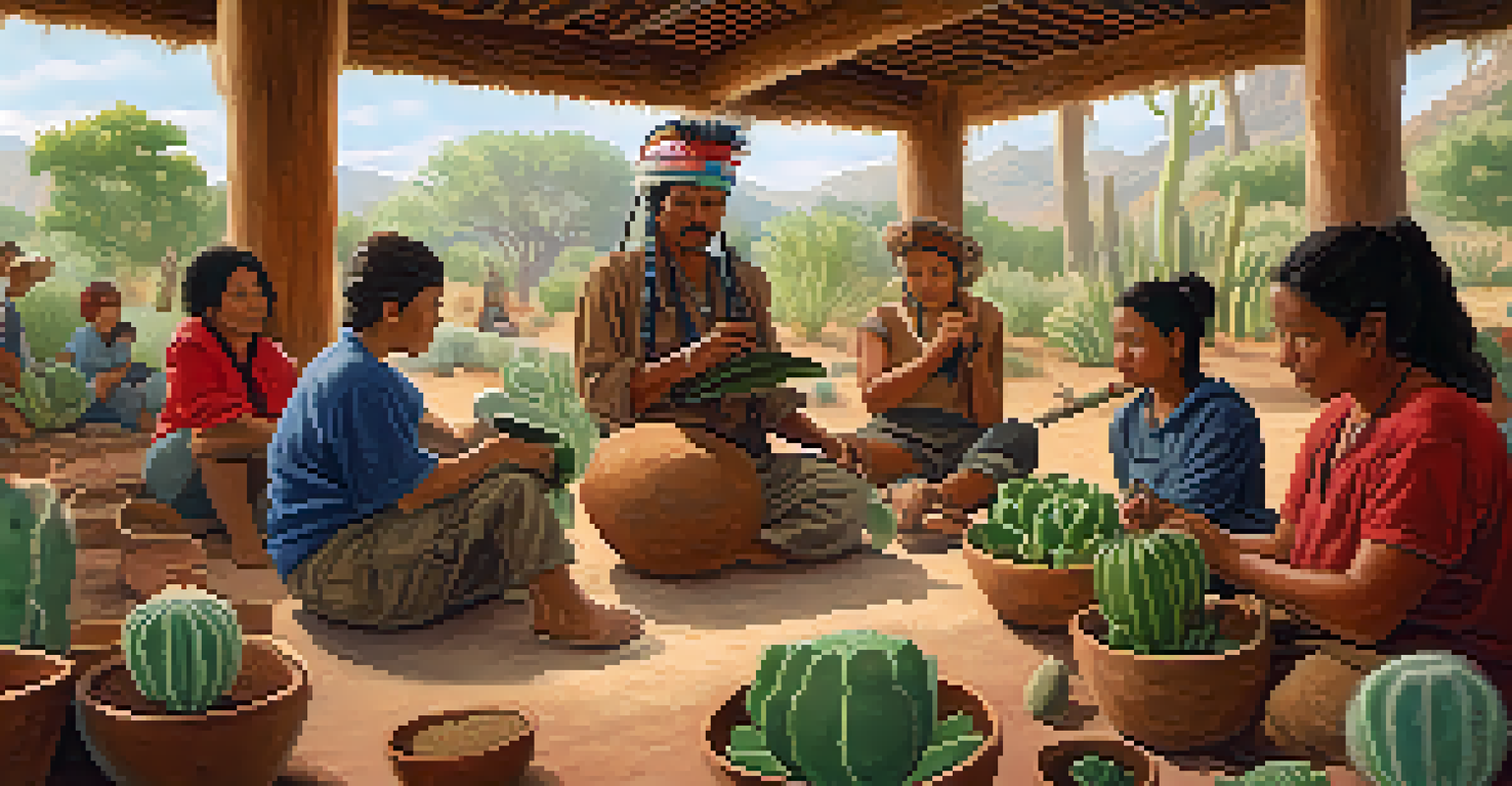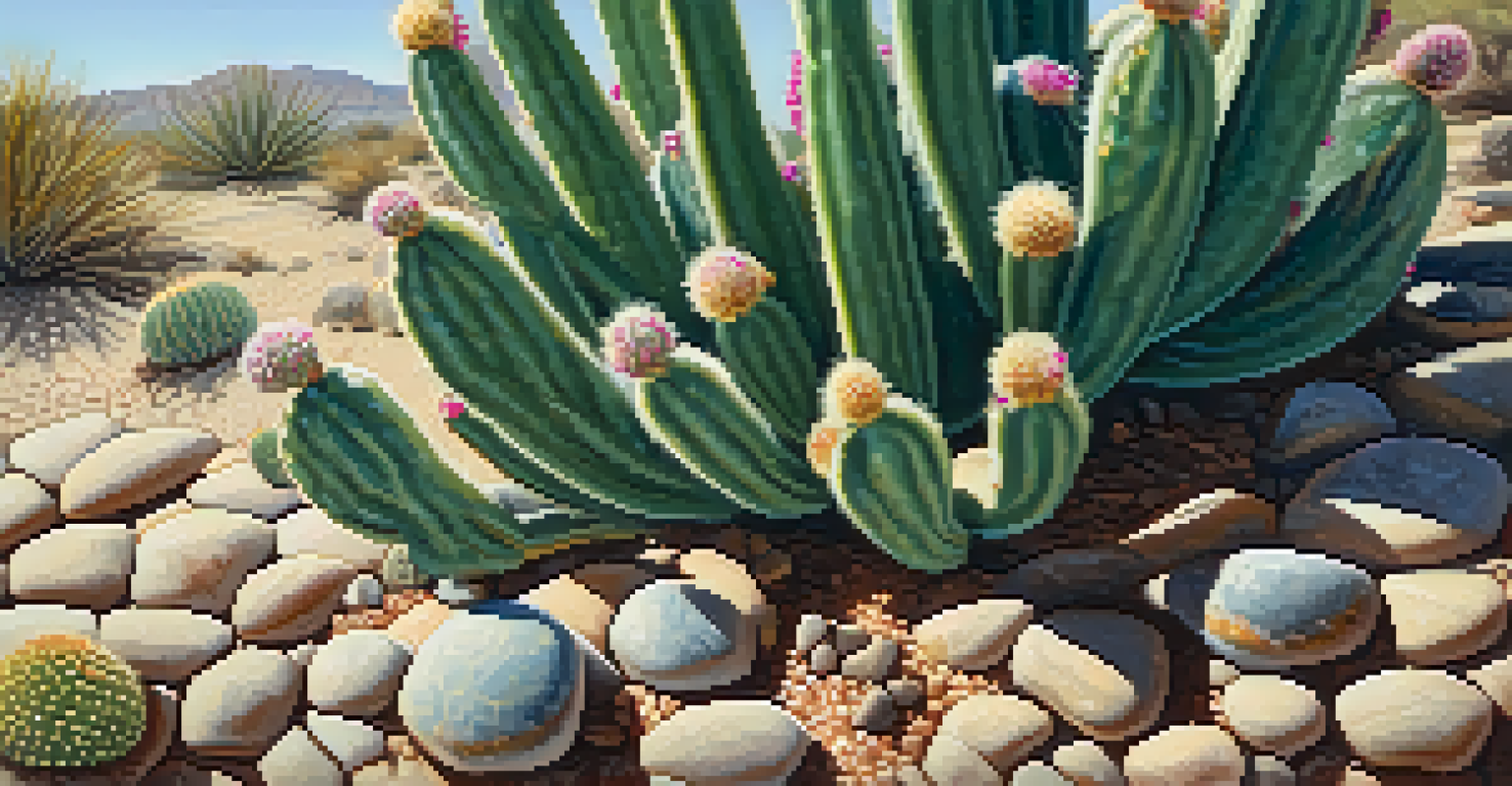Environmental Impact of Peyote Harvesting: Ethical Issues

Understanding Peyote and Its Cultural Significance
Peyote, a small cactus native to the southwestern United States and Mexico, has significant cultural and spiritual importance, especially among Indigenous peoples. For centuries, it has been used in religious ceremonies, serving as a conduit for spiritual experiences and healing. However, this sacred plant's popularity has led to increased demand, raising concerns about its sustainability and the ethical implications of harvesting.
The preservation of cultural heritage is not just a matter of ethics; it is essential for the survival of the ecosystem that supports it.
The cultural significance of peyote cannot be overstated; it’s intertwined with the identities and traditions of many Indigenous communities. As these communities face modern challenges, the preservation of peyote practices is crucial for maintaining their heritage. Yet, as more individuals seek peyote for personal use, the delicate balance between cultural respect and commercial exploitation becomes increasingly precarious.
By understanding peyote's significance, we can appreciate why ethical considerations in its harvesting are paramount. It's not just about the plant itself but also about the people and traditions that depend on it. This understanding sets the stage for discussing the environmental impacts of harvesting practices.
The Environmental Consequences of Overharvesting Peyote
Overharvesting peyote poses serious environmental risks, threatening the plant's survival in its natural habitat. As demand rises, unsustainable harvesting methods can lead to habitat destruction and loss of biodiversity. Peyote's slow growth rate means that populations cannot quickly recover from intensive harvesting, making it crucial to recognize the ecological stakes involved.

Moreover, the areas where peyote grows are often sensitive ecosystems that rely on the balance of various species. Disrupting this balance through overharvesting can lead to cascading effects, affecting not only peyote but also other plants and animals that share its habitat. This interconnectedness reminds us that environmental impacts extend beyond a single species.
Cultural Importance of Peyote
Peyote holds deep spiritual significance for Indigenous communities, intertwining with their identities and traditions.
Therefore, addressing overharvesting is not just an ethical issue but also an environmental imperative. Sustainable harvesting practices must be prioritized to ensure that peyote can thrive for generations to come. This brings us to the ethical dilemmas surrounding harvesting methods and their impacts on both the environment and Indigenous communities.
Ethical Dilemmas in Commercial Peyote Harvesting
The commercialization of peyote presents complex ethical dilemmas, primarily regarding the exploitation of Indigenous cultures. As businesses seek to capitalize on the growing interest in psychedelics, the risk of commodifying a sacred plant becomes a pressing concern. This raises questions about who benefits from peyote sales and whether those benefits reach the Indigenous communities that have historically cared for and utilized the plant.
We do not inherit the earth from our ancestors; we borrow it from our children.
Additionally, commercial harvesting often ignores traditional practices that ensure sustainability. Many Indigenous communities have developed methods for harvesting peyote that respect the plant's life cycle. In contrast, a profit-driven approach may prioritize quantity over quality, leading to detrimental effects on both the environment and cultural heritage.
These ethical dilemmas emphasize the need for a balanced approach that respects Indigenous rights and promotes sustainable practices. Finding common ground between commercial interests and cultural preservation is vital to addressing the complexities of peyote harvesting. This leads us to explore potential solutions and collaborative efforts between stakeholders.
Sustainable Harvesting Practices for Peyote
Implementing sustainable harvesting practices is crucial for preserving peyote populations and the surrounding ecosystems. Techniques such as selective harvesting, where only mature cacti are harvested, can help ensure that younger plants continue to thrive. Additionally, educating harvesters about the plant's growth patterns can lead to more responsible practices, benefiting both the environment and local communities.
Collaborative efforts between Indigenous communities and conservation organizations can promote sustainable harvesting methods. By combining traditional ecological knowledge with modern conservation strategies, stakeholders can develop guidelines that protect peyote populations while respecting cultural practices. This partnership approach not only empowers Indigenous voices but also fosters a sense of shared responsibility for the plant's future.
Environmental Risks of Overharvesting
Overharvesting peyote threatens its survival and disrupts the delicate balance of sensitive ecosystems.
Ultimately, sustainable harvesting practices can help balance the demand for peyote with the need for environmental preservation. By prioritizing ecological health, we can ensure that peyote remains available for future generations. This raises essential questions about the role of legislation and community initiatives in supporting sustainable practices.
Legislation and Protection for Peyote Cacti
Legislation plays a critical role in protecting peyote cacti from overexploitation and ensuring sustainable practices. In some regions, peyote is classified as a protected species, limiting harvesting to specific guidelines. These legal frameworks aim to balance cultural use with conservation efforts, but enforcement can be challenging, especially in areas where illegal harvesting occurs.
Moreover, the legal status of peyote varies significantly across different jurisdictions, leading to confusion and inconsistencies in protection efforts. Some laws may not adequately recognize the cultural significance of peyote, resulting in disconnects between legal protections and Indigenous rights. This inconsistency highlights the need for a more unified approach to legislation that incorporates Indigenous perspectives.
As advocates push for stronger protections, the conversation around peyote legislation must also include the voices of those who have historically relied on the plant. Engaging Indigenous communities in the legislative process can lead to more effective and culturally appropriate protections. This collaboration is essential as we explore the future of peyote and its role in both culture and ecology.
The Role of Education in Promoting Ethical Harvesting
Education is a powerful tool in promoting ethical harvesting practices and increasing awareness about the environmental impact of peyote harvesting. By informing both consumers and harvesters about the importance of sustainability, we can foster a culture of responsibility. Workshops, seminars, and community outreach programs can share knowledge about traditional practices and the ecological role of peyote.
Moreover, educational initiatives can bridge the gap between Indigenous knowledge and modern conservation efforts. By integrating traditional ecological practices into broader conservation education, we can create a more holistic understanding of peyote's significance. This approach not only respects cultural traditions but also emphasizes the importance of biodiversity and ecosystem health.
Need for Sustainable Practices
Implementing sustainable harvesting methods is essential for preserving peyote populations and respecting Indigenous cultures.
As more people become aware of the issues surrounding peyote harvesting, they can make informed choices that support sustainable practices. This shift in consumer awareness can lead to increased demand for ethically sourced peyote, encouraging businesses to adopt responsible practices. Ultimately, education can play a crucial role in shaping the future of peyote and its cultural and environmental significance.
Fostering Collaboration Between Stakeholders
Fostering collaboration between various stakeholders is essential for addressing the ethical and environmental challenges of peyote harvesting. Indigenous communities, conservationists, lawmakers, and consumers must come together to create a shared vision for sustainable practices. By working collaboratively, these groups can develop comprehensive strategies that respect cultural traditions while ensuring the preservation of peyote populations.
Such collaboration can take many forms, from joint conservation projects to inclusive policy-making processes. Engaging Indigenous leaders in discussions about harvesting practices and legal protections is critical for creating effective solutions. This partnership approach not only empowers marginalized voices but also leads to more culturally relevant outcomes.

As we navigate the complexities of peyote harvesting, the importance of collaboration cannot be overstated. By uniting diverse perspectives and expertise, we can create a future where peyote is respected, protected, and available for generations to come. This collaborative spirit is vital for addressing the ethical issues surrounding peyote while ensuring its environmental sustainability.